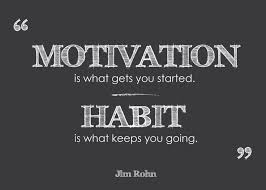
Today I wanted to offer you some more CIMA study tips to help you stay committed to studying when times get tough.
Because sticking to any new routine – no matter how good for you – is a real challenge.
Why?
Because whether it’s healthy eating… exercising… CIMA study …or whatever else…it doesn’t take long for the initial enthusiasm and motivation to fade away.
Our unconscious mind takes over and wields more power than our conscious mind.
We do so many things on autopilot that it almost feels like we have no control over the decisions we make each day.
I’ve got a question for you…
Just think about it. What did you eat for breakfast today?
I bet you it was pretty much the same as yesterday, the day before, and the day before that. And don’t be surprised if what you have tomorrow – and the rest of this week – is pretty similar to what you had today.
But lets imagine that from today you decide it’s time to try a new, healthier breakfast meal going forwards. Sounds easy, right? But before you know it, your mind is craving that sugary cereal you used to have and you start to imagine how good it used to taste…that’s the power of your unconcious at work.
It doesn’t matter how desperate you are to look good…feel energetic…be more confident in yourself…your brain has been programmed to do what you’ve always done in the past. And it resists change.

We are creatures of habit.
So even with the best intentions to make a positive change, if you’ve often procrastinated over your CIMA study in the past, your brain thinks this is the normal thing to do. And it tries to talk you out of doing the right thing in favour of staying in your comfort zone.
But here’s the good news.
Just as bad habits form and become second nature, so can good ones.
That means IT IS POSSIBLE to stay committed to your CIMA study. And run your exam prep on autopilot.
Now it won’t be easy, but luckily there are a few things you can do to re-programme your unconscious mind and make the habit of studying – even when you don’t feel like it – last.
Study Tip #1: Accept that it’s going to be painful for a while
It’s human nature to want to do the easy thing in the short term even though this harms our long term results.
But if you realise from the outset that staying committed to your CIMA study is going to be hard, difficult and uncomfortable, then at least you have prepared your mind for the challenge ahead.
Accept that it’s going to be really tough to stay on track – for at least the first 30 days – but also realise that the pain is temporary. And it will only get easier after that.
Think of it like starting up running again after a long lay-off. Those first few weeks of hitting the road are going to be a long, hard slog. It’s going to ache, you’re going to be sore, and you’ll have days when you’d rather just stay in bed for an extra hour rather than go for that early morning run.
But after a while, your feet will get used to pounding the streets, your muscles will get used to clocking up the miles, and you’ll want to keep up the momentum because you can see that you’re making progress.
The same goes for your CIMA study routine. You will go from uncomfortable to unstoppable if you just give yourself the time to let your brain accept that this is going to be the new norm.
Study Tip #2: Identify your biggest roadblocks
Behind every habit is a trigger that makes it happen. So if you often find yourself putting off studying – and doing something else instead – think about what is causing you to procrastinate… is it boredom? Difficulty? Fear of failure?
Whatever it is, you need to identify the cause and then look to manage it so that you take back control of your CIMA study.
For example, if you tend to avoid studying because you’ve failed your last CIMA exam, try to destroy the fear rather than letting it overwhelm you.
How can you do this?
A good starting point is to confront the fear right away.
If you’ve failed CIMA exams – like I did – then there are all sorts of powerful emotions that try to prevent you from studying again. After all, who would want to go through those same feelings of embarrassment, frustration and helplessness when we get our results and see that we haven’t passed?
So consider the worst case scenario – such as failing again – and think about what you can do to avoid this happening next time.
Quite often this means changing the approach that you used previously in your exam prep…
Perhaps you ended up skim reading parts of the syllabus because you needed a more exam focused CIMA study text rather than a larger (and more expensive) one filled with periphery information that took up a lot of your time.
Or perhaps you didn’t really understand some of the topics in your paper and would benefit from a top tutor explaining the study material to you rather than having to work things out for yourself.
Or perhaps your question practice was too easy compared to the real thing and you needed CIMA practice exams of the required standard to prepare you for the actual exam
If you chuck out your old approach and prepare differently next time around, the odds of you failing again are much longer.
And once you’ve dealt with planning for the worst case scenario, take the time to visualise what would happen if things go perfectly.
Imagine all the powerful emotions that you will go through when you find out that you’ve passed next time out. Those feelings of joy…relief…satisfaction…pride…achievement…self-confidence…are all worth striving for, right?
Study Tip #3: Make it easier to resist temptation
Once you’ve thought about and identified what causes you to avoid studying, the next step is to make it more difficult to give into temptation. And easier to do the right thing.
This means removing distractions and temptations as much as possible.
For instance, if you want to get in the habit of studying before leaving for work each morning, try having everything you need at your study desk already organised the night before so that you can quickly get started – and not procrastinate – when you get up.
Or if you usually try to study at home on the weekends – but end up sleeping or watching TV rather than working through your CIMA study material – try to find a study space well away from the comfort of bed or the sofa.
In fact, what worked best for me was to not study at home at all. Instead I would go to the local library – or use the office where I worked – to take advantage of the work space there. Sure, I’d rather of been in the comfort of home and not studying at all, but I knew I had to do the right thing rather than the easy thing if I wanted get good results.
And you know that, too.
Study Tip #4: Set Yourself SMART goals
You’ll have a much better chance of committing to your CIMA study if you set yourself SMART goals. That means goals that are specific, measurable, achievable, realistic, and time-bound. This way you avoid the vague promise to yourself to “study more” where your free days end up drifting and you fill your spare time with trivial things when you know you should be studying.
A good starting point is to think small. Tiny is even better.
For instance, if you set yourself a target of reading 15 pages of your study text an hour before you leave for work each weekday morning, then you have a specific, measureable, achievable, realistic and time-bound study goal to work towards. That’s SMART.
You’ll be far more committed to your CIMA study if you know you only have to do this certain amount of work on it each day. And when you’re doing this every day – or nearly every day – it really does build up to a lot of study hours and progress.
Compare this to allocating 3 hours of study each evening after a long day at work…do you think you’d be able to stick to that routine for long?
Study Tip #5: Become accountable
If you know someone – or something – is keeping track of your progress, you are far more likely to stay on track with your studies when times get tough and you start losing motivation.
Ideally, you want to find an accountability partner — someone who knows what your goals are and is there to encourage you and push you when you feel like giving your studies a miss. This can be a family member, a best friend, a fellow student, a work colleague…whoever you trust to take what you are doing seriously.
Someone who will be prepared to take you to task when you feel your commitment slipping.
Other resources you can use to help are:
- A study schedule (calendar/spreadsheet/planner) to write down what your study habits will be each day. And then tick the days off where you were able to successfully stick to your plan. Seeing yourself check off those days can be really motivating.
- Set reminders on your phone to jog your memory into putting those good habits into place. This can include setting your alarm 30 minutes or an hour earlier then you usually wake up so you can study first thing, and another alarm as to when you will go to bed so that you are less likely to stay up too late and pay for it the next day.
- You can even post your study goals on social media. Telling other people about your renewed commitment to studying makes the idea more real and therefore more likely to be committed to.
Conclusion
As difficult as committing to your CIMA study can be, when it eventually becomes the norm for you, you’ll be running your CIMA exam prep on autopilot. This will mean you spend less time and energy worrying about what you should be doing and instead you’ll be taking action each day without even have to think about it.
And it is small, consistent action that leads to big results.
Just be prepared to give it time and use the 5 steps outlined above to help you along the way.
P.S. Committing to your CIMA study becomes that much easier when you have a proven-to-work course structure to follow. To find out more, click here
